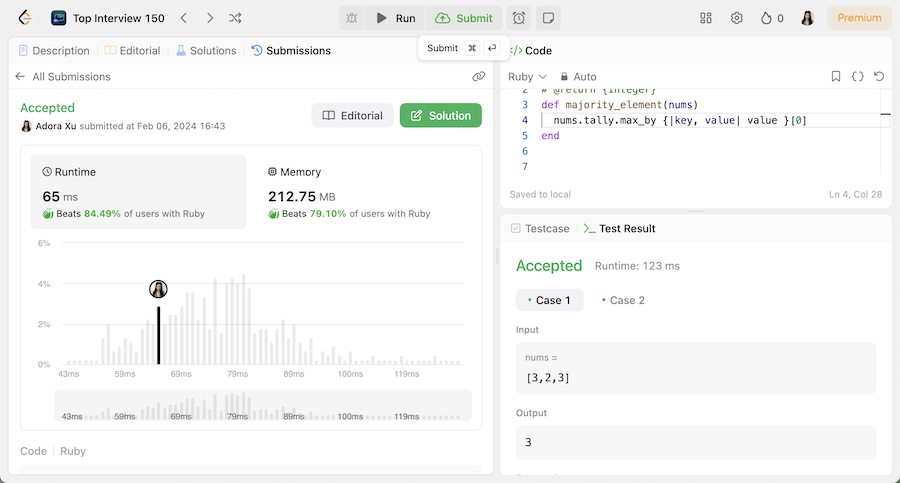為了加強自己的程式能力,因此開始記錄每天刷leetcode的解法+說明,會用Ruby、python和JavaScript三個語言來解題,今天是第八天,讓我們開始吧!

題目來源:leetcode
在讀題目的時候,發現有一個小細節,題目寫要找出出現次數大於[n/2]的數字,且假定這個數字一定存在Array中。那也就代表,只要找出最常出現的數就可以了,因為陣列中只要其中一個數出現的數量大於[n/2],剩下的數出現次數就不會大於[n/2],可以想像成,西瓜被挖走一半多一點,剩下的西瓜再怎麼分都沒辦法大於一半。
所以這題只要找出,出現次數最多的數字即可!讓我們開始解題吧~
Ruby
1 | |
這裡使用了tally
在Ruby API的解釋為:
1 | |
意思就是建立一個hash,key是self,value是出現的次數,簡單的範例:
1 | |
建立了hash之後,即可以使用max_by,max_by,max_by允許輸入值為{},會返還{}內最大的值,因為返還的會是Array,來看一下範例:
1 | |
如果只要取出key呢?可以使用[0]來取出Array的第一個數,也是Array內最常出現的key:
1 | |
Python
1 | |
在python計算數量可以使用Counter()物件,來看看範例:
1 | |
接著可以使用.most_common(1)[0][0],(1)代表取出第一個結果,這時輸出的值會是[(3, 2)],因此還必須要使用[0][0]代表取出第一組Array的第一個數才會得到解答!
JavaScript
1 | |
JS我採用的是摩爾投票法,消除不同元素之間的票數,最終保留的就是可能的主要元素。
一開始先把count設定為0,如果接下來遇到的數字相同count + 1,不同count - 1,如果count又變回 0(代表刪掉一樣數量的a & b),這時就會更改majority = num,最後殘存活下來的就是majority了!
Comments